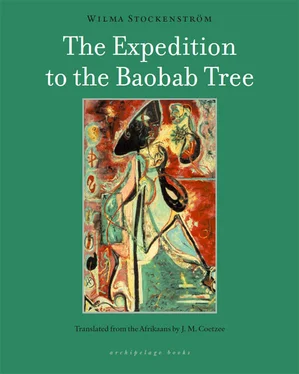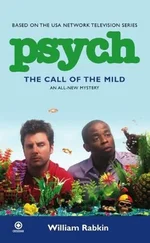When I was expecting my third, I visited an abortionist. My friend stopped me. Life is cheating me, life is poison honey, I complained tiredly. She threw away the seductively scented violet tree roots I had bought.
What did you pay with? she asked.
With myself.
She scolded me. Whore, she called me, which made me laugh.
If it were true I’d be rich.
Go away! she scolded.
Yes, I joked tetchily: the world stretches as far as the master’s eye can see.
One day. Oh yes, one day. As far as the master’s eye can see, but I wanted to go still further. One day.
My next benefactor-owner plainly had a wider worldview, stretching from deep in the bush to the sea’s horizon, including negotiations with gold-miners and woodcutters and the dispatch of goods up the coast and, through the intervention of the charming stranger to whom I, an impudent slave girl, became enslaved, to lands over the sea as well.
It was far, but I wanted still further. I had a craving for distance.
Here now in my baobab I am still bounded on all sides by the horizon. So does one ever break through a horizon? Life is treacherous, like poison honey. Come from afar, I thought I should perhaps pack all the landscapes that had passed before my eyes in a ring around me, that would certainly yield a wider horizon. The further I traveled, the wider it had to become. And in fact everything has shrunk to what a tree defines.
Here there is standstill. Here there are hollowness and artefacts. Here there is care — I hesitate to call it adoration — on the part of the little people who pretend they are invisible. Here there are gifts of venison and sour plums and edible fungus. My ostrich eggshell with the neat little hole breaks and is replaced. My collection of beads is added to. I acquire clothes. I feel good, I feel presentable in my leather apron and cloak decorated with spring-hares’ bones, in my self-strung black and green beads and my long strings of ostrich eggshell chips. They are the clothes of a new life in which I travel all around the baobab and never lose sight of it, since what lies on the road back happened only once, and what lies in whatever direction on the other side is (bitter realization) not intended for me to tackle on my own.
I am a melancholic but I do not stop searching, said my ever-voyaging, ever-traveling, my always charming stranger when the eldest son made him the offer. I like to reconnoiter. I like to discover. I cannot get enthusiastic about humanity, but I do not stop testing and do not stop searching.
No, let me not curse him. He should have known that I had no choice but to follow him, for I was not a searcher, I was one driven from circumstance to circumstance, and whoever bought me had to keep me, and this time would keep me. Sometimes it was pleasantly advantageous and easy to be property. I was simply someone together with someone else.
Even before the death of the youngest son, the eldest son had conceived the fantastical plan and begun making arrangements for a brand new kind of expedition. No one had ever heard of such a thing, and our city dwellers were not uninformed. News from across the seas and from the interior reached them regularly. As wide-awake traders they were skeptical about whatever was supported by nothing but guesswork and whatever was, in their considered opinion, the idle talk of poets. The dream of the unknown. The enticement of the foreign. Playing games with knowledge. For such purposes the city had its marginal figures, the subtle word artists and the storytellers on the squares to whom the children listen open-mouthed and whose entertainment value, including the word artists’, rose and fell according to whether they succeeded in exciting or boring listener and reader. Yes, they, the colorful madmen. And if a rich man’s heir wanted to act stupidly romantic, wanted to prove that an overland route ought to exist, then it meant that there would be opportunities for preying in his absence. It meant that the trade contacts so carefully initiated and forged by his father could now freely be grabbed and taken over by whoever was sly and quick enough. No one expected competition from the middle son, seeing that he had long since settled into a remarkably profitable brothel enterprise behind the glitter and show of the gold-trading business that he had already begun to manage several seasons before the father’s death.
And then there was the unfortunate accident to the youngest son, the carefree one. So many disasters struck this house. On the death of his father there followed the quarrel between the eldest son and the spiteful unmarried daughter. She left the family home fuming. Now her dried-out spirit nourished itself on thoughts of vengeance. They swelled up her whole existence from early in the morning till late at night as she intrigued and schemed to bring the eldest son to his knees, even if it meant that she and the married sisters and her two brothers should all go under. She had the look of someone on the hunt. She had the smell of someone who had become cancerous, and whatever she came in contact with she polluted with the venom and the cunning in her breath. She was contaminated with bitterness.
I stayed out of the way of her breath and attached myself with softening heart to the youngest son, to whom I had been bequeathed. He was good and kind and not interested in the slightest in the slaves and slave girls and the other duties he had inherited, and went his way unperturbed with an engaging smile and a casual greeting.
No, I did not believe the stories that he sought out his death because of a disappointment in love. Someone who knew the way through the coral reef as well as he did does not simply stumble, so whispered the slaves to each other, and the mourners in the house. Two fatalities between new moon and full moon. How long is the life of a man? From one wink to another of the lightning. From the fuller swelling of the drop to its fall. So long is the life of man. From move to checkmate. And heads were shaken and hands were wrung — yes, so long is life. And the young tree was chopped down, and the voyage was short and the boat capsized and sank, and the mourners piously got through with all such nonsense as befitted the occasion.
No, he was not the type who willfully stepped on a stonefish. Perhaps one of his comrades called his name to draw his attention to a school of rabbitfish in the purple deep-sea water beyond the reef, and he looked up and staggered on a sharp coral point and lost his balance. That was more likely. That, too, was what his comrades said. They brought him home on a stretcher, in his death as slender and beautiful as he was when he left the house in the morning to go and catch fish in that remote bay. Helplessly they had had to watch how, after they had carried him back to the beach, he had thrown himself down without control and kicked, and how foam had come from his mouth, and how he had then grown still, glorious again after the brief mad interlude that had helped him from life to death, again in death as perfect and untouched as he had been in life, a youth who was contained in himself, I reckon, and in his self-absorbed charm had never experienced either sincere friendship or sworn enmity.
I counted up what I stood to lose by his death and what I stood to gain. For the umpteenth time my future was being decided on a whim. I waited tensely. For I knew this fear. Were he and I not old friends? If anyone was ever true to me, then it was he, perhaps because he had become part of me and accompanied my heartbeats as he accompanied my breathing, because he sat in the white of my eye, in the trembling of my fingers. My companion, who had come to acquaint himself with me on my forced march, who had openly made himself at home alongside me and blown his suffocating breath over me — here he was again.
Читать дальше












